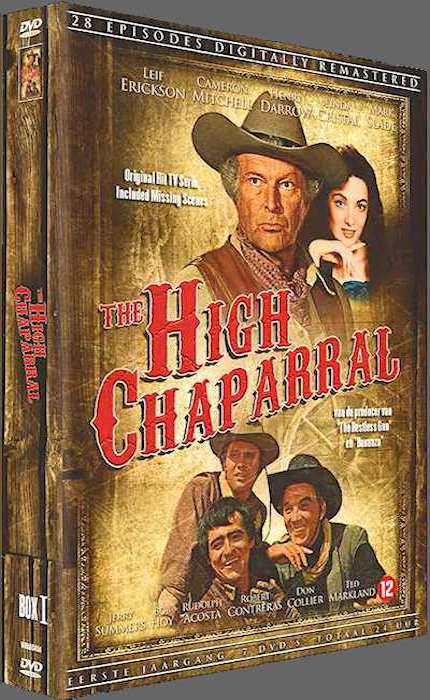 Season Three on DVD
Season Three on DVD
Now!
Season 3 of The High Chaparral on DVD is available for order now!
Remember if you want your own copy of The High Chaparral Seasons 1 & 2, you can order from The High Chaparral Reunion.
Each DVD set is $65.00 plus shipping. The majority of US players accept these with no problem.
For more information visit The High Chaparral Reunion website.
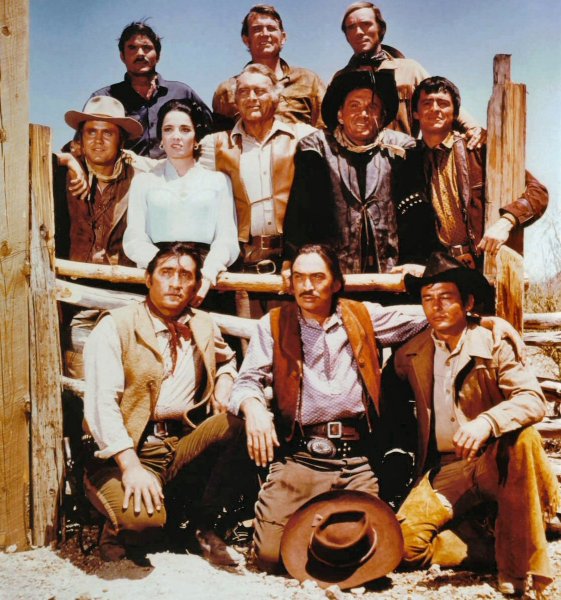 The High Chaparral Reunion
The High Chaparral Reunion
March 20-23, 2014
Join us at the Cannon ranch house in Tucson, AZ on March 20-23 for The High Chaparral Reunion. You'll meet cast members, talk with the people who made the best TV western, walk through the place where it was filmed, and hear backstage stories from cast and crew.
It's a one of a kind experience that you have to experience yourself to truly understand.
This year's Reunion is unlike any other with several special events like:
- Rudy Ramos premiering Geronimo, Life on the Reservation, a play by Janelle Meraz-Hooper.
- Producer Kent McCray's presentation on how a script gets broken down and arranged for daily shooting.
- Casting Call with Susan McCray - selected fans will participate in a casting session with Susan, then some will be cast to appear in a reading of a scene with the stars.
- Book signing of Harry's Piano with Susan McCray - each book purchased will include The High Chaparral Suite, produced by Susan with themes from The High Chaparral composed by her father, Academy award winner Harry Sukman, along with two pieces written and performed by him.
- Wild West Festival at Old Tucson, Sponsor's Dinner, one on one time with the stars, and much more.
Don't miss your chance!
Visit www.thehighchaparralreunion.com for info, and register today.
LIKE THE HIGH CHAPARRAL REUNION ON FACEBOOK:
A True American Western on INSP
by Penny McQueen
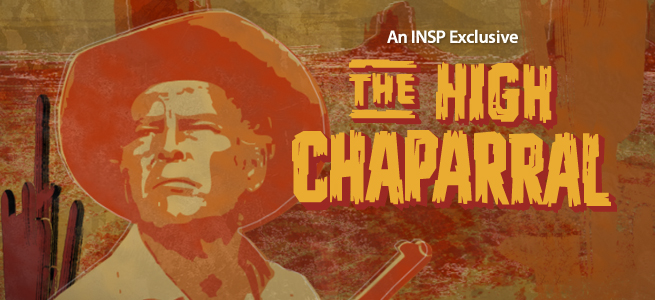
On Saturday, September 15th, 2012 the INSP network broadcast The High Chaparral, making dreams come true for fans who’d been missing the Cannons and Montoyas for decades. With exclusive cable rights INSP is the new home of HC and continues to include it on their regular programming schedule.
Last year in September Doug Butts, SVP of Programming said, “What makes this announcement so special is that INSP now is the exclusive home of this western classic. The High Chaparral is one of the greatest programs of this genre and it makes a perfect addition to our growing western block, SADDLE UP SATURDAY.”
Recently I asked INSP why they chose High Chaparral? Mr. Butts shared a part of his thinking process with me.
“Overall, I wanted to feature true American westerns on Saturdays. I especially selected The High Chaparral because it centers around a family with an interesting ethnic mix between white Americans, Mexicans and native American Indians. All having to fight, love and live through some very challenging events. They’re strong and daring. Willing to lay down their lives for one another."
"The show features "Big" John Cannon (Leif Erickson), his brother Buck (Cameron Mitchell) and son Billy Blue (Blue Boy) (Mark Slade). After Blue Boy's mother Annalee (Joan Caulfield) was killed in the first episode by an Indian arrow, John Cannon agrees to marry Victoria Montoya (Linda Cristal), the daughter of the powerful neighboring rancher Don Sebastián Montoya. This arranged marriage brought her brother Manolito (Henry Darrow) into the picture, and he also came to live with the family. So this created a very interesting blend of lifestyles between these two ethnic groups in a very intimate way. But another strong reason was because Victoria’s character is very soft and mellow when necessary, but then she can become a strong figure within the family dynamics when necessary."
"One final note, I was especially interested because this series was created by David Dortort, who had previously created the hit Bonanza for the network. So the story telling and authenticity was strong.”
-Doug Butts, SVP Programming, INSP

For the 2013 High Chaparral Reunion INSP provided a letter for each person who attended. Since the Reunion is meant for the entire Chaparral family I'm sharing it again with you.
The High Chaparral Reunion
Casino del Sol
Tucson, Arizona
Dear Henry, Don, Kent, Susan, Rudy, and all the Super Fans of The High Chaparral,
What an honor it is for me to greet you on behalf of the entire staff at INSP. We are so proud to be the exclusive cable network home of The High Chaparral! Our viewers just simply love the series. This week’s reunion is sure to be a memorable occasion as you gather to celebrate one of the greatest westerns in American television history. All cast members have become legends and should feel a great sense of pride in the impact of their life and work.
When I was given the task to populate 124 hours of weekly entertainment programming for INSP, I searched for content that was entertaining and safe for the entire family. At the same time, I wanted something uniquely American. THC fit the bill perfectly. I was particularly interested in THC because it so brilliantly broke through the stereotypical mold of the 1950s and 1960s and redefined the TV western with authentic portrayals of the roles Hispanics and Native Americans played during that time period. This is one of the many reasons I chose The High Chaparral and why it is still loved today. America is a melting pot of cultures and people. The producers, directors, actors, and fans of THC realized this truth, and made a commitment to stay true to those principles. You were ahead of your time.
This great occasion would not be possible apart from the commitment and devotion of Penny McQueen and her faithful colleagues at www.thehighchaparral.com. Their vision and passion allow the grandeur of this great show and its cast and crew to remain in the public eye. INSP considers them true allies in our quest to introduce The High Chaparral to a whole new generation and reintroduce it to those fans who have loved it all these years.
It is with deep gratitude that I, along with the entire NSP staff, welcome you to the 2013 Reunion of The High Chaparral. Enjoy these treasured moments with those who’ve made history.
We consider it a privilege to celebrate this weekend with you.
Much obliged,
Doug Butts
Senior Vice President of Programming
INSP Network
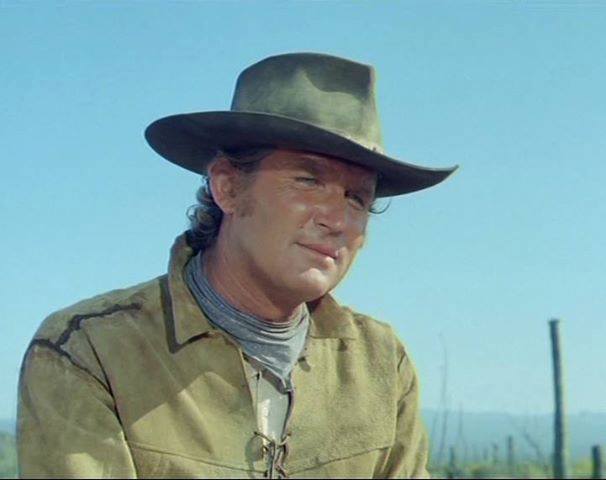 Don Collier News
Don Collier News
Don Collier (Ranch foreman Sam Butler) is up for an audition with a major audio book company. We hope it goes well and they like Don’s voice.
So you can join in the fun here’s a couple of practice runs:
![]()
Don Collier reads sample from The Virginian
![]()
Western reading from Don Collier
If you're in Arizona plan to attend the Wild Western Festival in Glendale Arizona, October 25-27. Don Collier and several other western celebrities will be there. http://www.wildwesternfestival.com/
Be Social - Join the Conversation
Don't miss drop-in visits from Linda Cristal, Don Collier, Susan McCray, and Kiva Lawrence Hoy, wife of Bobby Hoy. You can see if others answer questions about Henry Darrow, Cameron Mitchell and Mark Slade too - join the fun on Facebook!
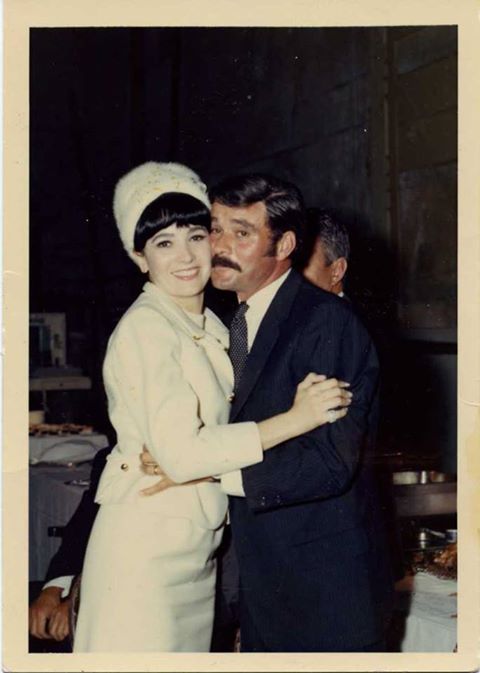
See what you're missing? This wonderful photo of Linda Cristal and Bobby Hoy was on Facebook last month. Lots of treasures appear every day.
Don't miss the action. LIKE The High Chaparral Reunion on Facebook. Stop in, click LIKE and watch for HC Ranch Foreman Don Collier's comments on posts, Susan Sukman McCray's visits, and Kiva Hoy's comments.
If you like groups check out the High Chaparral Group for lots of great discussion, photos and links too (you'll see Don, Susan and Kiva there often).
There are lots of other groups too. Most are closed to prevent spam so you'll need to join:
Mark Slade (Blue Cannon) has a Twitter account for the Mark Slade Studio so you can be up to date on new projects and announcements.
Snakes and Quail and HC
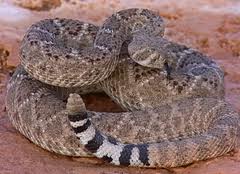 The recent article on “Reality Bites” is hilarious! My husband and I laughed and laughed.
The recent article on “Reality Bites” is hilarious! My husband and I laughed and laughed.
Now, watching reruns on ISNP, I have noticed that there seems to be only one rattlesnake in Arizona. This creature of remarkable longevity has bitten Manolito and John, and it has threatened Buck’s horse in “A Piece of Land” (I think)….and Manolito’s girlfriend in “Bad Day for a Bad Man.”
This rattlesnake seems to have at least nine lives…perhaps it is part cat. Actors shoot it repeatedly but although they make the snake jump, they miss dealing it a fatal blow. It always returns, albeit in a slightly less colorized form than the rest of the episode. I guess its name is Stock Shot Snake.
The Gambell’s quail is generally heard in the background as well…although I may be watching too many HC episodes because my husband thought he heard that bird in our backyard the other day. Perhaps it was a mockingbird who also likes HC.
M. Jane Rodgers
Ed note: Stock Shot Snake definitely got a workout, but I shudder when I hear Kent McCray describe one particular crew job on the Tucson set - Snake Wrangler. His job was patrolling the brush all around the ranch set, clearing out rattlesnakes. And we thought the Cannons had it rough!
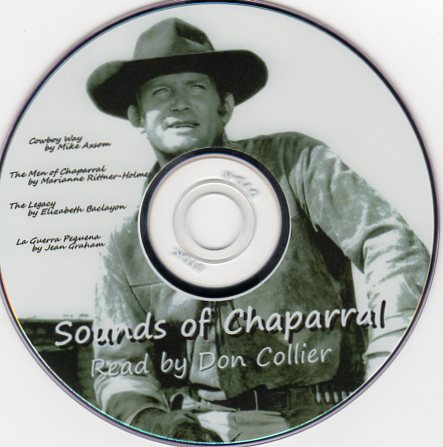 Fan Writing Contest CD
Fan Writing Contest CD
Sounds of Chaparral with four fan written pieces presented by Don Collier is now available.
Don chose the winners from a large group of contest submissions for this CD and enjoyed reading every piece.
Sounds of Chaparral is $10 and includes these four titles:
1. The Cowboy Way by By Mike Axsom.
2. The Men of The High Chaparral by Marianne Rittner Holmes.
3. The Legacy by Liz Baclayon.
3. La Guerra Pequenia by Jean Graham
Congratulations to these talented writers and ALL the fans who participated. It was great fun and we appreciate each one of you!
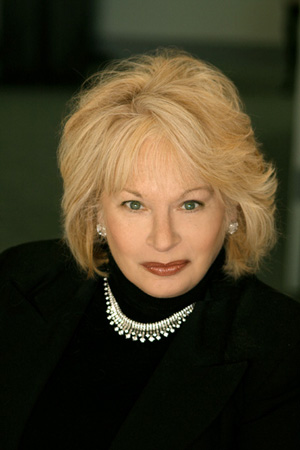 The Skunk FM Becomes
The Skunk FM Becomes
NBC News Affiliate
Susan McCray, VP of Programming for Hooten Broadcasting Company announced today station KUNK better known as The Skunk FM broadcasting throughout Mendocino County in California, has become an NBC Affiliate. Ms. Mcray said “All of our hourly news will now be NBC news reported by such fine and respected on air talent as Brian Williams and Lester Holt.” Ms. McCray said “as an NBC affiliate we will also have special items reported by Tom Brokaw and access to other fine programs”
Susan is the wife of Kent McCray, production director of The High Chaparral and she worked in casting for HC. Her father was Harry Sukman, academy award winning composer for The High Chaparral.
NBC goes way back in Susan McCray’s family starting with her father who composed music for numerous NBC shows, her father-in -law who was VP of radio programming and ttelevision at NBC in NY, her husband an NBC producer starting in Live television with NBC stars as Bob Hope, Red Skelton, and Milton Berle to producing NBC television series as Bonanza, The High Chaparral, Little House on the Prairie, Father Murphy, Highway to Heaven, and numerous movies of the week. Susan McCray’s own history with NBC includes VP of Talent for Michael Landon casting all Mr. Landon’s iconic series and movies of the week.
President of Hooten Broadcasting Company, Claude “Hoot” Hooten also has a history with NBC including NBC TV in Miami and station KGBS an NBC affliate in Los Angeles. Ms. McCray said “All of us at The Skunk FM are very excited and looking forward to continuing our rich history with NBC by having this great relationship with NBC News.
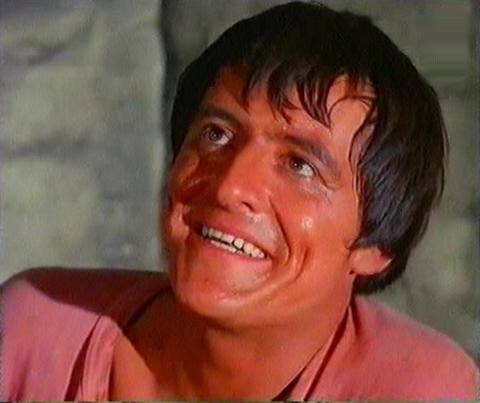 Interview with Henry Darrow
Interview with Henry Darrow
By Becca Gladden
Henry Darrow is an Emmy and ALMA award-winning actor who became an international superstar as the dashing Manolito Montoya on the television series The High Chaparral (1967-1971). Born in New York, but raised in Puerto Rico as a teen, Darrow headed to California after receiving an acting scholarship during college. He didn’t have instant success in the entertainment industry, but fame – when it finally arrived – came like a flash.
His biography, the aptly named Henry Darrow: Lightning in the Bottle, is a must-read for anyone interested in the acting profession, Hollywood history, The High Chaparral, or Henry's inspiring life story. Reviews, book excerpts and ordering information can be found at www.henrydarrowbook.com. The book was written by Jan Pippins with Henry Darrow.
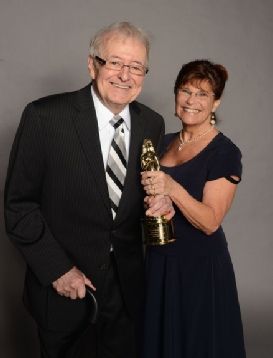 A recipient of the prestigious Ricardo Montalbán Lifetime Achievement Award at the 2012 ALMA (American Latino Media Arts) Awards, Darrow achieved numerous milestones in his career that paved the way for future actors. Most notably, his breakout role on The High Chaparral marked the first time a Latino actor starred in a dramatic series on television.
A recipient of the prestigious Ricardo Montalbán Lifetime Achievement Award at the 2012 ALMA (American Latino Media Arts) Awards, Darrow achieved numerous milestones in his career that paved the way for future actors. Most notably, his breakout role on The High Chaparral marked the first time a Latino actor starred in a dramatic series on television.
Q. It’s such an honor and a thrill for me to talk with you. I’ve been a fan since I was kid.
A. Oh, gosh, really? You weren’t for Mark Slade [co-star on The High Chaparral]? The nine-year-olds used to go for Mark, but then I had the mature 11- and 12-year-olds [laughs].
Q. No, I was definitely a fan of yours! What do you think you might have done for a living if you hadn't become an actor?
A. I was at the university in Puerto Rico and I was going to go to Spain as a Second Lieutenant. My major was Political Science. I crossed the campus and I bumped into a friend and he asked how come I wasn’t joining the contest for scholarships [for acting]. So I did, and I happened to win, and instead of picking the Neighborhood Playhouse in New York, I picked the Pasadena Playhouse. One of my classmates was an actress named Ruth Buzzi, if you remember her. We had worked together on a couple of plays there.
I did a year with a repertory company at the Pasadena Playhouse – when I went from [the surname] Delgado to Darrow – where you do six or seven plays in a row. We did Firefly, we did Dark of the Moon, and several other plays. It was a repertory company with myself and Monte Markham – who did a number of series – and it went well. That’s where I finally came back and got cast in High Chaparral.
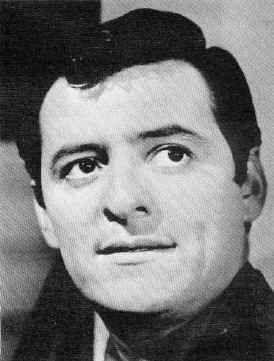 Q. Can you tell me what prompted you to use the surname Darrow instead of Delgado and did you ever regret that decision?
Q. Can you tell me what prompted you to use the surname Darrow instead of Delgado and did you ever regret that decision?
A. Darrow was picked because there were very few Darrows. But the main reason I changed my name from Enrique Delgado Jr. was that Delgado was a Latin name and they were mostly Mexican actors. In fact, I had a Latin/Mexican agent named Carlos Alvarado, who handled mostly and only Latin actors. Of all the parts I did over the years with him, the only non-Latino part was a character called Blackie [laughs]. That was a TV show with Victor Jory. I had no problem going with another agent and this fellow’s big credit was that he had Superman and George Reeves, and I went with him for a few years.
I wound up doing a play called The Wonderful Ice Cream Suit that Ray Bradbury wrote, at the Coronet Theatre in Hollywood, and was seen by a producer named David Dortort, who did Bonanza. Then, he tried to get in touch with me after the play closed six months later – which was the longest any play I’ve ever done in Hollywood lasted – but it was the time I changed my name from Delgado to Darrow, and he was looking for Delgado. I heard that there was a part open of Manolito on a show called The High Chaparral by David Dortort and I thought, “Well, what the heck?”
Manolito is what changed my career. I’d been in town for five years, and then I gave myself another five years, and then I was working on the third set of five years when I did the play. I was seen by David Dortort and the next thing I know, I’m in an office at Paramount with the head of casting, the producer, the director, other casting people, and all of a sudden I wound up in a series called The High Chaparral.
Q. I grew up in Tucson, so I know how harsh summer is in the desert. How did you cope with the long hours of filming in the excessive heat?
A. My first year at Chaparral, and when we used to shoot out in Tucson, we’d have a lot of foreign people come from different parts of the world and they’d pass out because of the heat. I stupidly picked a black hat and a leather jacket and woolen pants. The only thing I did correctly was I got some small shoes – they were right to my ankle – and I’d have at least two or three pair during the year because walking on those stones in the heat and in the sand was pretty bad.
I remember Leif Erickson – when he first met me, I was standing around, and up, and I wanted to be in on everything – and he said, “Young man, you know, you’d be better off if you sat down for a while. So, I didn’t, and the rest of the year he got me and said, “You know, you’d be better off if you laid down in your dressing room with the air conditioning,” and I wound up doing that from the second year on.
I used to take little bits of dialog that people didn’t want – Leif Erickson and Cam [Cameron] Mitchell said, “Oh, give it to Henry.” They’d give me a line or two and what was happening is that they wanted to get home early. I’d wind up waiting an hour and a half, two and a half hours until I finally got my line, and it might be something like, “We’re going to Tucson,” and all of a sudden we’re the last cars leaving the location, which was some 25 to 30 miles out of the hotel. But, I was into everything at that time and I really enjoyed it.
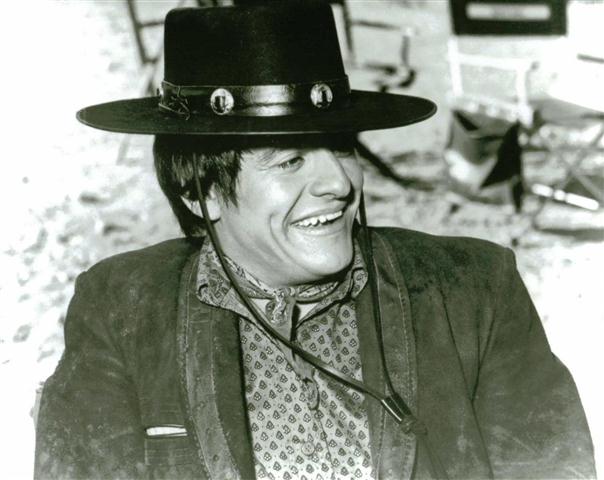 Q. You are best known for playing Mano on The High Chaparral. How much of Henry Darrow is in Manolito Montoya?
Q. You are best known for playing Mano on The High Chaparral. How much of Henry Darrow is in Manolito Montoya?
A. I’ve wondered how much of me is in Manolito Montoya and, I don’t know, I guess something [laughs]. I’m an outgoing person and I was in the beginning.
Q. Why do you think Manolito is still popular with fans 45 years later?
A. [Sounding incredulous] I don’t know! I mean, people are coming [to fan events] from Ireland, from New Zealand, from England, from Chile, from all over the place, and they’re as old as I am – I’ll be 80 in the middle of September. I don’t know. People think I’m a fun-loving kind of guy and I guess I was during the first few years of doing the show and then, gradually, it becomes work. And working out in the desert, as you indicate here, growing up in Tucson, you know how harsh the summers are. It was really, really hot. I mean, wow!
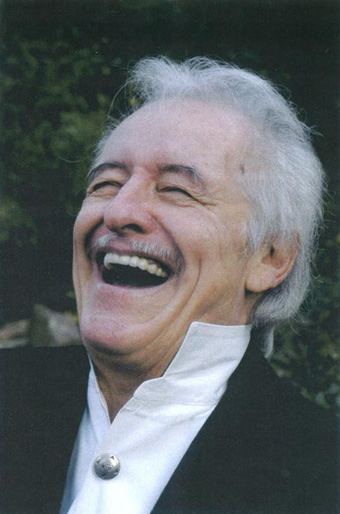 Q. I don’t know how you guys did it.
Q. I don’t know how you guys did it.
A. I don’t recall, myself, how we did it. There was a guy named Don Collier, who played Sam Butler, and sometimes he’d just be sitting on the fence with the fans around watching us shoot, and he’d just keel over. He was wearing a full leather outfit! It was extraordinary that he lasted that long. He was a real good rider and we had a good time. Usually, when we go out on some of these Western film festivals, we’ll have guys like Bob [Robert] Fuller and other guys that are around, Duncan Regehr, who played Zorro, and I played Zorro in a series called Zorro and Son. And then I played Zorro’s father. We worked in Spain and I replaced Efrem Zimbalist, Jr.
I think the role of Manolito is the highpoint of my career, where you go from a total unknown – and you’ve been around for 13 years – and then all of a sudden you’re being reviewed by TV Guide and the New York Times, who said, “Henry Darrow should be in every scene,” and you go, “Wow!” Then you have people on the show that tease you about the reviews. Cleveland Amory from TV Guide said, “He laughed too much,” so, the second year, I said, “Okay, let me hold back on the laughter and maybe they’ll take me a little more seriously.”
Q. You were arguably one of the hottest actors in the world when The High Chaparral was at its peak. I read a quote where you said, “I really thought I was Elvis Presley for a while.” When you achieve that kind of fame, is it hard to stay grounded?
A. Fame came all of a sudden. But a couple of times I’d be in an airport and someone would say “Hey!” and I would turn thinking they meant me, and then they’d say, “Mr. Ricardo Montalbán?” So, I learned to just keep walking when someone said, “Hey!” I signed Ricardo’s name a couple of times because people thought that I was him. After the first year, by the second season, I learned you can get first-class tickets for your wife and your kids and, in the meantime, I’d be in coach and everybody else would be up front, and I’d go, “Hey, what’s going on?” Then, the publicity fellow said, “Hank, you’re one of the five regulars [on The High Chaparral], so you deserve first-class. All of a sudden, I’m waiting for the limo and I’m being picked up at the airport with my name on a tag, and it’s like, “Yeah!” Through everything, you go, “Holy cow, this is great.”
The fifth year was supposed to come and I asked my publicity guy, “Hey, the season’s coming and I’d like some tickets for the Dodgers.” And he said, “Hank, your show is going to be canceled.” I said, “What?” And he said, “Yeah, there will be no more tickets for anybody from the Chaparral.” So, you learn. You learn. Gradually, I learned what Leif was getting, money-wise, and then you ask for a little more next time and you get a little more. We never got to the level of the Bonanza boys, who were making $15,000 and $17,000 an episode.
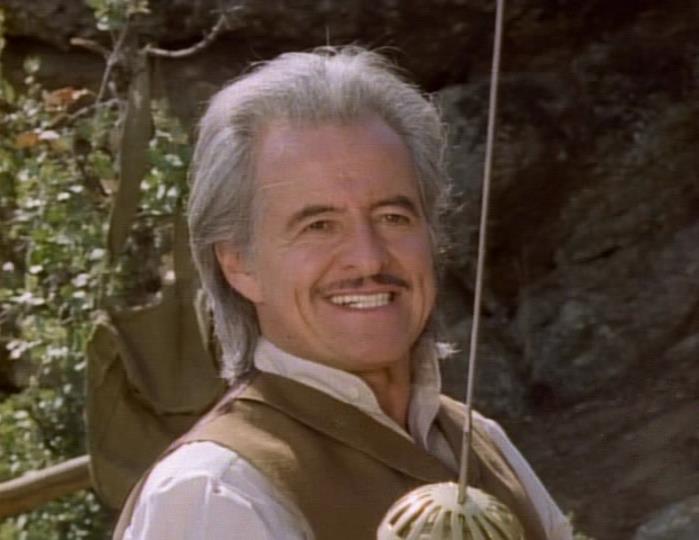 Q. Why didn’t you get to that level?
Q. Why didn’t you get to that level?
A. We only lasted four years. They went on for 10 and 12 years and they kept getting another $1,500 and another whatever it was. But, I got to work with a lot of fine people – Kurt Russell, Jack Lord, Robert Lansing worked the show – a number of people and stars worked the show. All of a sudden, somebody said, “Jack Lord wants you for Hawaii Five-0. I go there and he remembers, “My god, you played the Mexican police guard,” when I was doing Stoney Burke with Warren Oates [and Jack Lord]. It was both of them in the car, and I say, “¿Sí, señor?” and Warren Oates tells Jack Lord, “Let me do it, I speak Spanish.” Then he said, [in very poor Spanish pronunciation], “Señor, por favor, Rosarito Beach.” And I said, “Yes, sir, you just go down to the 106, take a left at Avenue 13, and you’ll be there in about an hour [laughs].” He never forgot that. I wound up doing two other episodes – one with Sally Struthers and then one with Jean Simmons as my wife.
Q. You were the first Latino actor to star in a network TV drama on The High Chaparral. At the time, were you cognizant of the impact you would have on future generations of Latino actors, and, if so, was that a difficult responsibility to bear?
A. As you indicate, I was the first Latino actor to star in a network TV drama, an hour show. And I also was the first Latin Zorro. I had played the voice of Zorro for CBS, then I played Zorro – well, it was like the older Zorro, 55 and older. I got up on the desk and pretended I was fencing and almost fell off, and they said, “That’s what we want for the part,” a little on the clumsy side and over the hill.
Going into the second season of Chaparral in 1970, Ricardo Montalbán started a group called NOSOTROS. In Spanish, ‘nosotros’ means ‘us,’ and that was having to do with Hispanic actors. In membership, we had Tony [Anthony] Quinn, Desi Arnaz, Gilbert Roland – and I turned out to be the first Vice President of the organization.
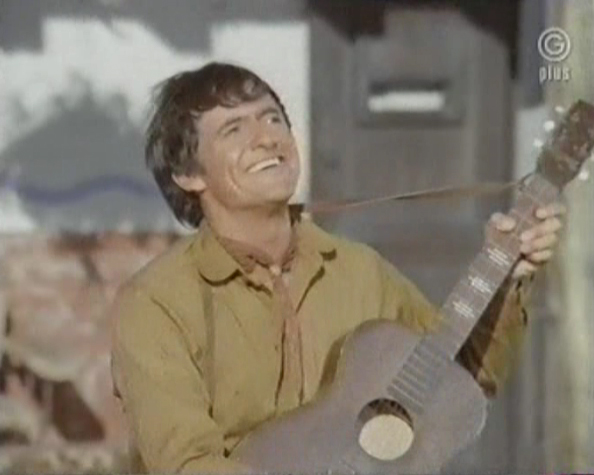 Q. Like most people in the entertainment industry, your career ebbed and flowed. How did you cope with the hard times?
Q. Like most people in the entertainment industry, your career ebbed and flowed. How did you cope with the hard times?
A. Boy, you said it. It was really up and down. What I tried to do, mostly, when I wasn’t getting TV work, I could work in the little theaters around Hollywood, since I had a kind of a reputation and I had done a series. They had houses – I think they were 60- or 90-seat houses – and you could do parts that you normally would never get in television and in features.
Q. What is the best career advice you would give to someone trying to break into show business today?
A. If you’re in Hollywood, then it’s television and coaches that teach camera technique. If you’re in New York, then it would have to do with plays and getting to teachers that are great teachers – the Sandy (Sanford) Meisners and all those kind of people that have worked with really top stars.
I’ve been in Wilmington, North Carolina, for the past ten years. I retired and, when I came here, within a two-block area, there’s a director, a writer, an actor – it’s just wonderful. I worked through the University of North Carolina here. I worked in some of the classes. I’d go in and give talks and, at other events, I’d work some movies with them, which were usually 5- to 9-minutes long – for no money, just to work with young people again, and that energy revitalized me.
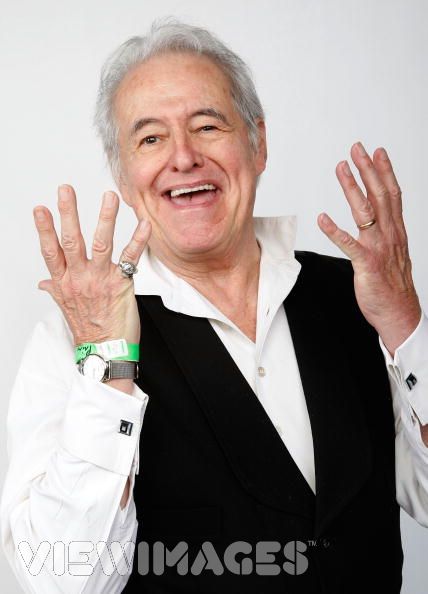 Q. What are you most proud of in your career and what would you like your legacy to be?
Q. What are you most proud of in your career and what would you like your legacy to be?
A. What am I most proud of? I don’t know, I mean, the thing that I enjoyed most doing was, of course, the first year of High Chaparral. I had a chance to get a book on sign language and I used sign language [to communicate with the Native American characters on the show]. And the scenes with Linda Cristal [who played his sister, Victoria], where we spoke Spanish. They had an extra 20 or 25 seconds and they’d say, “Okay, guys, go,” and we’d start and she’d say, [in a high-pitched voice], “Manolito, you’ve been drinking!” “Hombre, no, no, no, no, no.” It was fun. The four years were fun and I had a nice time working with Ricardo Montalbán and Fernando Lamas and Alejandro Rey, and I even worked with the old master, Gilbert Roland. And then there was Ramón Novarro, who had worked in the silent film Ben Hur – he guest starred in an episode.
I also enjoyed playing Iago in the production of Othello down at Theatre by the Sea. That was with William Marshall. I took the part over in six days. The guy who was playing the part left it after a week or two and I stepped in and read – I had to use book the first two to three nights – and the first time I came out, William Marshall is in his white outfit, and he was kidding, saying, “I’m gonna get your white Puerto Rican ass,” and, with that, he grabbed my hand and he closed my script! And, I was like, “Ah, nooo!” So, I started my doubletalk. I knew, sort of, the beginning of the speeches, and I could say, “My Lord, [speaks gibberish],” and all you heard was “My Lord” and “Yea” and whatever, and I then found the page and went along with it. I had a good time doing that show, but it was so much hard work.
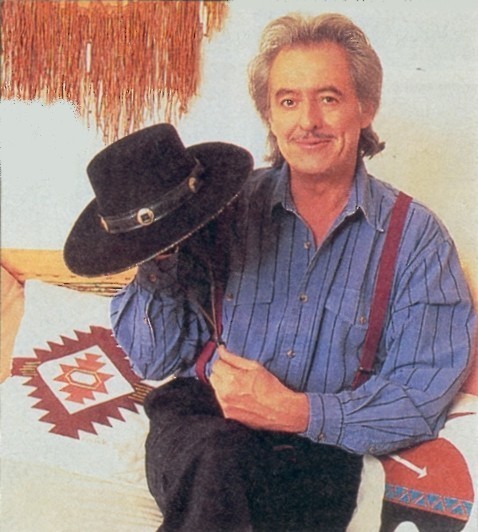 I was also doing General Hospital, playing the lawyer that was handling the divorce of the main actress, Emily McLaughlin, and Roy Thinnes at the time. Those were the days on soaps when you closed the door, the walls sort of moved – they didn’t make good sets back then. The casting director said, “Henry, you’re doing Iago and Othello, and you’re doing this? You can only have one master, because you’re supposed to work here again next week and the week after that.” And I said, “Well, a TV series – I never had thought of working in a soap – but, to play Iago, I thought, ‘Ahh.’” Other actors – Joseph Cotton, José Ferrer – they had wanted to play Iago at Theatre by the Sea, which was just a beautiful outdoor theater. The fog would come in from the ocean and cover the stage at the beginning. And then, the first thing that happened is, the guy that I’m trying to con out of more money, he puts his sword in his scabbard and the whole thing falls off his waist and goes rattling down to somewhere! There was a small airport around there and a couple of times a week this plane would come in and you actually had to wait for the plane to pass because it was making so much noise. One other time, there was a fire and there was a siren, and all the way down the street you heard [makes siren noise], and it got louder and louder and louder, and then it went away and went to where the fire was.
I was also doing General Hospital, playing the lawyer that was handling the divorce of the main actress, Emily McLaughlin, and Roy Thinnes at the time. Those were the days on soaps when you closed the door, the walls sort of moved – they didn’t make good sets back then. The casting director said, “Henry, you’re doing Iago and Othello, and you’re doing this? You can only have one master, because you’re supposed to work here again next week and the week after that.” And I said, “Well, a TV series – I never had thought of working in a soap – but, to play Iago, I thought, ‘Ahh.’” Other actors – Joseph Cotton, José Ferrer – they had wanted to play Iago at Theatre by the Sea, which was just a beautiful outdoor theater. The fog would come in from the ocean and cover the stage at the beginning. And then, the first thing that happened is, the guy that I’m trying to con out of more money, he puts his sword in his scabbard and the whole thing falls off his waist and goes rattling down to somewhere! There was a small airport around there and a couple of times a week this plane would come in and you actually had to wait for the plane to pass because it was making so much noise. One other time, there was a fire and there was a siren, and all the way down the street you heard [makes siren noise], and it got louder and louder and louder, and then it went away and went to where the fire was.
But my biggest career thing was right toward the end of my career. I did a one-man show on Miguel de Cervantes, who had written, of course, Don Quixote. It took me six months to prepare and, in it, I got to play the horse, Rocinante, I got to play my wife, Catalina, I played a senator. Unfortunately, it opened after 9/11 and we had very few people in the audience. Then, some newspaper wrote an article saying, “We can’t let this take us down. We’ve got to go out,” and they were talking about how it was time for us to get out and not be afraid. The last two weeks we had at least three-quarter audiences that came during the weekend and filled it up. That article came out and people started to go to the theater again, so it worked out well.
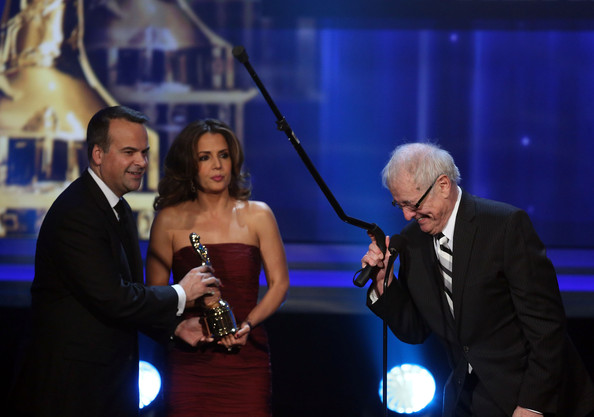 Q. Let’s circle back to the question about your legacy. It probably didn’t seem like it, at the time, that you were achieving all those firsts for Latino actors, and then you ended up winning the ALMA Award for Lifetime Achievement. Do you ever reflect back on your career and think, “Wow, I really did accomplish a lot.”
Q. Let’s circle back to the question about your legacy. It probably didn’t seem like it, at the time, that you were achieving all those firsts for Latino actors, and then you ended up winning the ALMA Award for Lifetime Achievement. Do you ever reflect back on your career and think, “Wow, I really did accomplish a lot.”
A. Only when other people remind me. I go out and sell photos at some of these Western events and people bring up other shows that I’ve done. It’s like, “We love you for Chaparral, but you were in Kojak, you were in Mod Squad, you did a series with David Janssen called Harry O, you did Zorro,” and I forget that, indeed, there’s a lot of stuff that I’ve done throughout the years.
I’ve been watching a show – Harrison Ford is in it – and I look in the cast list and he’s fourth down and I thought, “Holy cow! He’s not the leading man anymore. He’s a character actor.” And I became that in my 40s. I was still a scuzzbag when I did a Waltons – I played a movie director who goes to that area and I con one of the daughters into being the lead or something or other. Anyway, that was sort of like the last leading man thing that I did. And then I did a Police Woman with Angie Dickinson and my character was a scuzzbag, but I still had a little bit of leading man quality in me. The director said, “This is when you go up and kiss her,” and then she started to say, “Well, we’ll do it this way,” and then the director said, “Just grab her and kiss her!” And, so, that worked.
Then, all of a sudden, [you play] the part of the father. And, boy, when that happens, you go, “Whoa, what happened?” All of a sudden you’re playing dad. And, lately, I was playing granddad. Then [wife] Lauren said, “Let’s get out of California. It’s getting so expensive.” We left, sold our house for a wonderful price – we lived up in the hills in what was known as Altadena – and we had a lovely, spacious backyard and fruit trees and a fountain. It was just wonderful. Luckily, we were six months or nine months ahead of the fall of real estate. We came here with lots of cash in our hand and purchased a hundred-year old house in the historic district and that worked out very, very nice. I had a chance to work with Pat Hingle. He was a marvelous character actor. He was from Wilmington and I just saw an episode where he did a High Chaparral.
I got a call from a friend who said she’s going to try and get a plaque for me, because I went to a high school in Puerto Rico – the high school is The Lady of Perpetual Help – and she said, “I don’t think they remember that you graduated from there, so I’ll try and get a plaque for you,” and I thought, “Okay.”
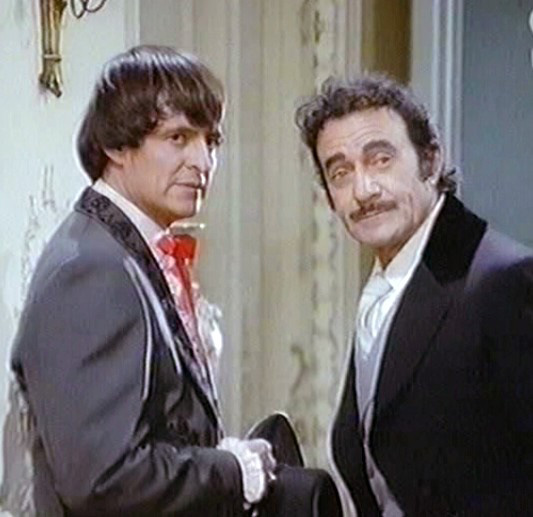 Q. It doesn’t really sound like you’re into that sort of thing – the recognition.
Q. It doesn’t really sound like you’re into that sort of thing – the recognition.
A. Yes! You know, when they give me an award, like the ALMA Award, I thought, “Yeah, I’ve done a lot of stuff.” I mean, different series and radio shows and Spanish commercials and commercials in English – I did commercials for Coors and Dodge and other things – and I thought, “Damn, that’s a lot!”
In the beginning, I gave myself 12 years and, man, it was slow. I did about 50 TV shows, but if you divide that among 12 or 13 years, that amounts to just a few shows a year. The sign of success was depending on how much unemployment you got. There was a stretch where I worked about two or three shows in a row and I made enough for them to pay me $18 a week, and then I was doing series work, and when I’d have a week off or something, I could collect unemployment.
Then, all of sudden, you’re in your 50s and you’ve jumped over the line.
But, it still sort of lingers. There’s still a remnant of people thinking of me in that particular way, even though I have white hair and I’ve gotten older and every now and then I use my cane to walk in a straight line. But, overall, the career has been good. My biggest fan was my mother, Gloria – she died last year in a nurse’s arms. She was at a home.
Q. She must have been up there in years.
A. Yes, she was 96. Dad died young – he was only 68 and he died of a heart attack, as did his other three brothers, all less than 70. I had my first heart attack and had a stent put in 12 years ago and I’m still going strong. I’ve changed my diet and stopped smoking.
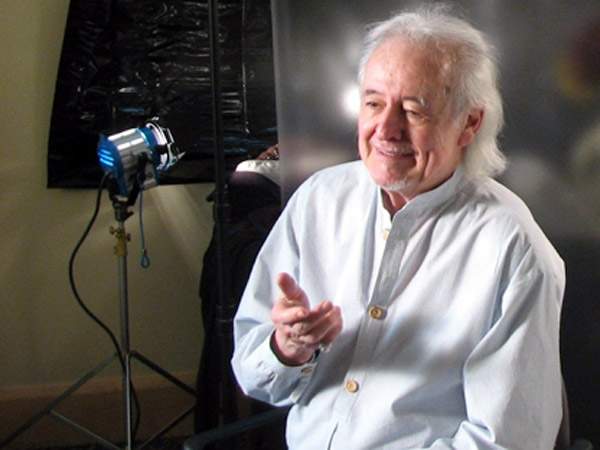 Q. Good for you.
Q. Good for you.
A. Yes, and I’ve been asked to do a kind of a radio thing and I said, “What’s the part like?” And they said, “It’s just called The Old Man.” And I said, “Well, okay, I don’t have to do anything with my voice, because it sounds old already.”
Q. I don’t think it does. I think you sound great.
A. Oh, thank you!
Q. You sound very vibrant and youthful – so you might have to do a little acting there.
A. Oh, thank you, that’s very nice.
Q. My last question is about what you’re doing on Facebook with fans who get to interact with you using social media. How is that working out?
A. I don’t even have a cell phone, my dear.
Q. So it all goes through Jan Pippins – she asks you the questions?
A. Yes, you hit it.
Q. She gets questions from your fans on Facebook and apparently she calls you and then she shares your answers with fans. People are so excited to read your answers, including me.
A. Oh, Becca, thank you. We’re going to have a copy of a painting coming out that a famous artist called J. Peralta [http://www.jperalta.com] painted. This lady is selling us the painting she did of me. Jan wrote a book – have you seen it?
Q. Yes, I have a copy.
A. Oh, great! Well, this artist made a painting of that [book] cover in color. It’s 18 x 24 and she is going to make a short number of them and sell them with a letter from me and an autograph. We’re supposed to go down to the Gene Autry Museum in L.A. and I said, “Sure, I’ll go. Get me an airplane ticket and one for my wife and I’ll be there.”
Q. That’s exciting.
A. Yes, it really is. And I thought, “Hey, I’m not through yet!”
read online at:
http://www.writesides.blogspot.com/
http://careerthoughts.com/henry-darrow
The High Chaparral is broadcast on the INSP network. See INSP.COM for schedule, details and to request your cable or satellite service carry INSP.
Let the folks at INSP know we're glad to have The High Chaparral on the air again on their Facebook page.

Past issues of the newsletter are available
on The High Chaparral Newsletter Web site.
High Chaparral on the Web
The Official High Chaparral website The High Chaparral Reunion
The High Chaparral Newsletter El Gran Chaparral Noticias
High Chaparral Fan Fiction High Chaparral Dutch Fan Site
Don Collier
Henry Darrow Bob Hoy
Ted Markland Susan McCray
Nightfall by Susan McCray Mark Slade
Rudy Ramos
Getting To Know You with Susan McCray
The Henry Darrow Biography, Lightning in a Bottle
AUDIO interviews with The High Chaparral cast & crew
Trail Dust Magazine

Cameron Mitchell
Henry Darrow Friends
Mark Slade
Don Collier
Linda Cristal
Susan McCray
Henry Darrow Lightning in the Bottle
Buffalo Gals
Do you have a favorite piece of memorabilia, or an article you'd like to share with other fans? Send it to info@highchaparralnewsletter.com, and we'll do our best to add it to a future newsletter.
Are you cleaning out the attic? Do you have HC or western items you'd like to share? DONATE to the Reunion auction! Email us to discuss how - and know the treasures you pass along will be just as treasured by the fan who receives it.

